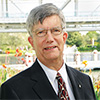Opinion
If You Are Hitchhiking, Are You Still on the Professional Road?
Download PDF

By Richard P. Mills, MD, MPH, Chief Medical Editor, EyeNet
It’s been several years since I brought up the concept in this Opinion column that freeloading on our colleagues is akin to hitchhiking. As you know, I’m not generally preachy about professional behavior, which is often a highly personal decision, but hitchhiking gets my goat. As a hitchhiker, you get a ride where you want to go, more or less, without paying the cost of gasoline or maintenance. But at least hitchhikers accept some risk from their behavior, while the freeloaders think they deserve to get away scot-free. This is what happens when your colleagues contribute to OphthPAC and to the Surgical Scope Fund, and the proceeds benefit all ophthalmologists, not just those who plunk down their money to support these causes.
As justification for their failure to contribute, the hitchhikers in our midst voice several complaints. For example, ophthalmologists may claim that their favorite candidates were not supported by OphthPAC, so they contributed independently. In so doing, they lost the collective power of PAC contributions. Or they may claim that their optometric referral base tracks such contributions and they land on a blackball list for opposing optometric scope of practice enhancements. But if everyone had contributed, there wouldn’t be a differential in contribution to be leveraged by the referring optometrists. Finally, they may not be aware that Surgical Scope Fund contributions are not reportable to any tracking agency, if so requested by the donor. (To learn more or to donate, visit www.aao.org/ophthpac and www.aao.org/ssf.)
But the most egregious freeloading comes in the area of state ophthalmology society membership. True, annual dues seem expensive, as much as or more than Academy membership in some cases. Oddly, some states maintain membership rates as high as 90 percent, while others struggle with 25 percent. The value equation isn’t that different; it just seems that the general attitude about state society membership is less enthusiastic in some states than it is in others. The trouble is that effective advocacy for legislation and regulation affecting our profession is expensive, and without wider participation, some societies have trouble meeting the challenge. So far, the efforts aimed at keeping surgical privileges limited to surgeons are doing very well, but state society membership is the potential Achilles’ heel. To help rectify the problem, the Academy is sponsoring a state society membership development conference Aug. 24 at the Hyatt Regency O’Hare, just outside Chicago. State society physician leaders and executive directors are invited to discuss ways to improve membership rates and share best practices. Check to make sure your state society is planning to send representatives. (Contact information is available at www.aao.org/statesocieties.)
Fundamentally, the idea of hitchhiking, or freeloading, comes down to a discussion of professionalism. Surely, we are bound to protect our patients’ welfare as part of our professional duty. Do any of us honestly believe that ophthalmic surgery should be performed in developed countries by providers less well trained than ophthalmologists? If the answer is no, then our duty as professionals is clear. And the title question of the editorial is answered, for me at least. If you are hitchhiking, you have left the professional road—and you’re likely to get a ride to someplace you’d rather not go.